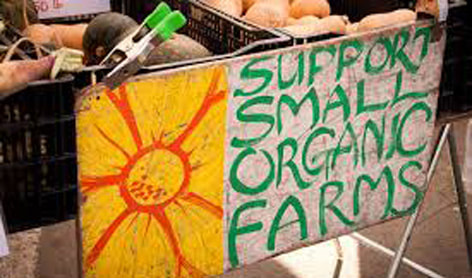Sustainability Nowby Zan Ronamoff The sustainable food movement is chock-full of vocabulary, organic and biodynamic jostling up against all-natural and eco-friendly. You can purchase produce at a farmers’ market or a co-op, or, increasingly, from CSA operations springing up all over the country. CSA stands for community supported agriculture, and it’s not just a new word—it’s an innovative concept that could be the backbone of a small, regional, sustainable foodsheds. The way it works is actually pretty simple: instead of buying produce a la carte from a retail operation (one of those grocery stores or farmers’ markets), consumers get their veggies directly from the farmer. They pay a flat fee upfront, and in return they expect to receive a box of assorted goods each week for a set period of time. What is offered and how much varies by farmer—the model has proven so popular that there are now CSAs for everything from eggs and milk to beef, pork, and even oysters! There is, of course, a catch: consumers aren’t guaranteed that they’ll get specific, favorite foods—or that they’ll get anything at all. Buying a CSA share can be more like investing than going grocery shopping, in that if the farmer you pick fails, you don’t get any bang for your buck.
The risk that a consumer takes in supporting the farmer, however, is also the reason that CSAs are so important. First of all, the way the model works ensures farmers will have cash on hand, upfront, when they need it most at the start of the growing season: to purchase seeds and tools they’ll need to get going, and to pay the laborers who will likely be helping them get there. Then, once season is in full swing, it helps cushion the blow if a particular crop fails. A few years ago a devastating tomato blight swept up the I-95 corridor, wiping out acres and acres between Virginia and New York. Any grower who had planned to make his or her living on tomatoes that summer was all but ruined—by the time the blight hit, it was too late in the season to replant. But farmers who had CSAs were able to strike tomatoes from their boxes, replace them with bumper crops of other veggies that had fared better, and live to see another day. (The blight was also an important reminder of why small-scale, diversified growing is so crucial in the face of global pandemics and climate change—but that’s a topic for another day.) Some complain that CSA shares are overwhelming, especially if you’re not used to cooking with fresh produce. It’s true that it can be frustrating to not be in control of what ends up in your fridge each week. But it also pushes people to explore new foods and new recipes, sometimes creating markets for crops farmers were otherwise having trouble selling. And with the explosion of CSAs in the past few years it’s now fairly easy to find one that suits your particular needs, delivering as much or as little as infrequently or as often as you’d like. CSAs work for farmers, and increasingly we’re finding ways to make them work for consumers just as well. To find out more about Community Supported Agriculture in your neighborhood, check out these links: http://www.urbanfarmonline.com/sustainable-living/urban-farm-resources/local-community-supported-agriculture/local-community-supported-agriculture.aspx http://www.nal.usda.gov/afsic/pubs/csa/csa.shtml http://localfoods.about.com/od/csa1/ Zan Romanoff graduated from Yale University in 2009 with a B.A. in Literature. She started at the Yale Sustainable Food Project as an undergraduate intern and subsequently worked as their Program Coordinator for several years after graduation. She currently lives in her native Los Angeles and serves as the Program Coordinator at the Silverlake Independent Jewish Community Center. She is also a freelance writer.
0 Comments
Leave a Reply. |
Welcome to the TorahTrek eJournal! Here you will find videos, interviews, articles, photos, and educational materials on the interconnections between Judaism, wilderness, spiritual practice and sustainability. Our goal is to support the spiritual/ethical lives of individuals, enliven and strengthen the Jewish community, and promote a sustainable society living in balance with the earth. Explore the eJournal by clicking on the topics below. Please share these resources with your friends! Topics
All
|


 RSS Feed
RSS Feed